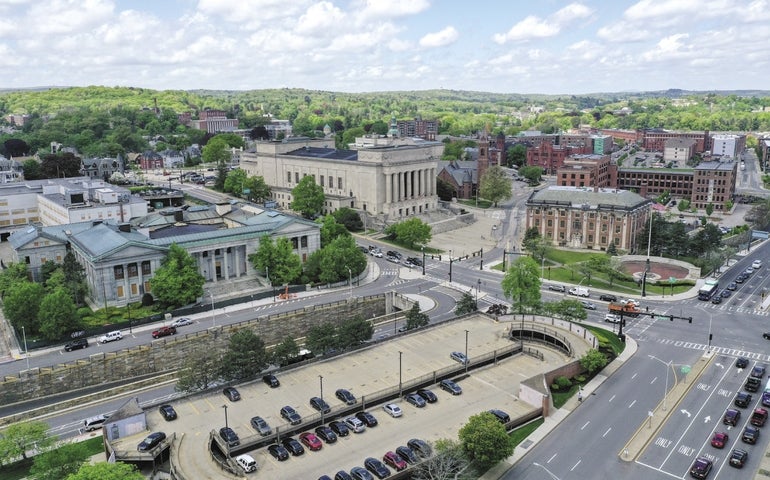With a few more years of planning and at least $170 million, three very different redevelopment projects at a trio of the city’s historic and long-vacant buildings at one of the city’s most high-profile intersections could dramatically transform a major gateway in Worcester.
Those three historic buildings – the Worcester County Courthouse, the Lincoln Square Boys Club and the Worcester Memorial Auditorium – are either underway on a development project or slated for a rehabilitation in the coming months and years.
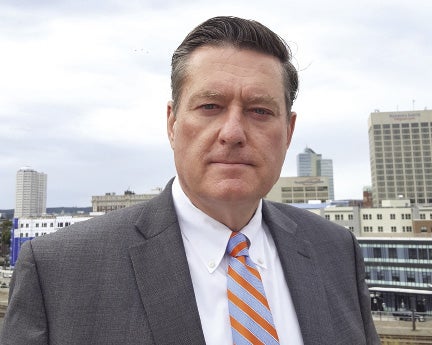
If all three are successful, city officials hope the projects could bring together three disconnected areas of Worcester each with their own economic progress of late. The Highland Street, Main Street, and Gateway Park areas and respective higher education institutions have all been separated by what City Manager Edward Augustus calls a Berlin Wall.
“By putting these [Lincoln Square buildings] into active reuse, we’re hoping this will bring the energy that exists in those three corridors in a way that adds to the walkability and fludiness at the intersection of these neighborhoods,” Augustus said.
The redevelopment catalyst
The most promising of the three projects is the $58-million, 117-unit apartment project to fill the 246,000-square-foot courthouse by Boston developer Trinity Financial. Construction began this spring.
Trinity purchased the building in 2017 for $1.3 million, about a year after New Hampshire Brady Sullivan Properties developer pulled out of a similar project at the building. The building has been on the market since it closed in 2007 when a new courthouse was built on Main Street.
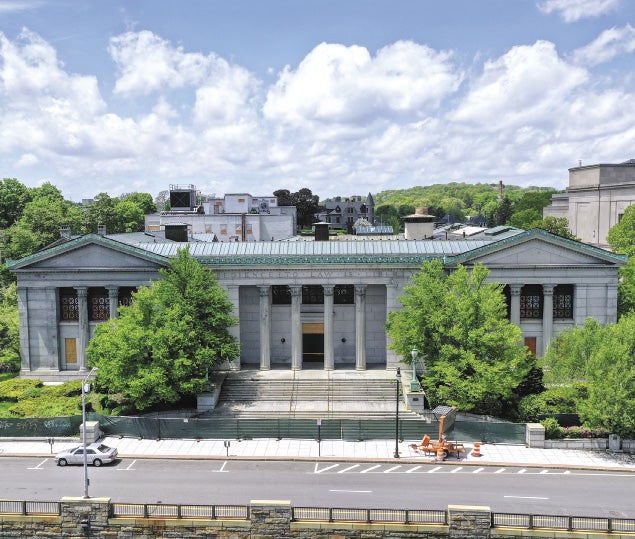
The building is the only of the three currently undergoing a comprehensive redevelopment project, and Trinity executives say this project could end up making the other two work.
“We hope this continues the work and revitalization already happening there and bring the other buildings back,” said Michael Lozano, a senior project manager with Trinity.
Lozano estimates around 200 people will be living in the former courthouse, which will help increase foot traffic.
As the first developer to make headway on actual construction, Lozano said Trinity would be happy with just about any use in the Auditorium or Boys Club.
“The idea is to get people out on the streets and living and working there at all times of the day,” he said.
A complicated $94M project
A few months before Trinity Financial emerged as the courthouse developer, Worcester began working with Boston historic property reservation firm Architectural Heritage Foundation to explore a possible reuse of the courthouse’s neighbor, the Worcester Memorial Auditorium.
The building, devoid of meaningful activity since 1999, could be overwhelmingly transformed for a modern use, but due to historic property restrictions and the building’s sheer size, the project could be the most time consuming.
AHF has now become a developer, proposing to renovate the building into a collaborative $94-million digital arts center and e-sports venue for the burgeoning video game industry with the help of Becker College in Worcester.
“It’s a gem, frankly, but a little bit of a complicated gem,” said AHF President Sean McDonnell.
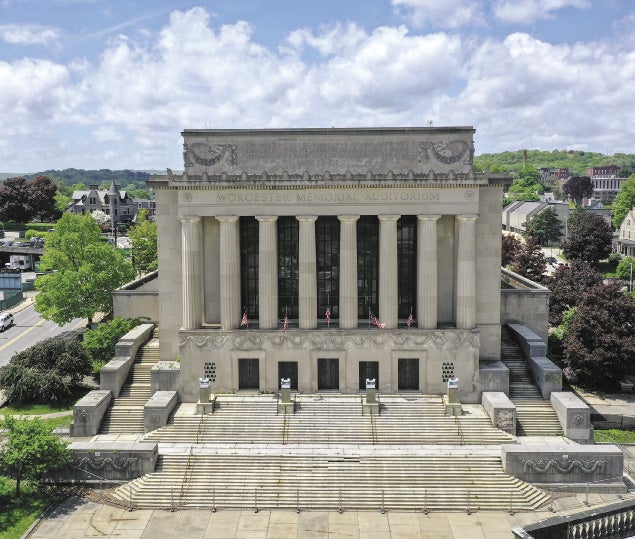
The project, in its infantile planning stage, is the most ambitious, as it calls for a 300-seat IMAX-style theater, a 2,000-seat performance space in the main auditorium, restaurants, and space for e-sports events and digital arts entrepreneurs.
Becker College, previously rumored as a possible tenant due to its growing e-sports progam, reached out to AHF to look at the building as an e-sports venue. After some research, McDonnell and his firm agreed.
“They impressed upon us that there was an incredible opportunity happening in that market that we didn’t see,” he said.
However, AHF is at least two years away from doing any work, as partners and funding must be obtained, according to a deal between the firm and the city.
The auditorium, referred to colloquially as simply the Aud, was built in 1931 to honor the 9,000 Worcester residents who fought in World War I.
As such, the structure is arguably the most historic out of the three, hosting performances, film viewings, basketball games and high school graduation for decades.
“It’s a gorgeous building,” said Augustus, recalling his high school graduation held in the main auditorium. “You can’t just go in there and gut it down. You have to keep historic elements there, but you also have to try to make it something that has modern day uses.”
Over the last decade, the city has opened up the auditorium to residents and developers to try to drum up some enthusiasm and/or ideas for the vacant space.
That work extended across the street to the Lincoln Square Boys Club. In Augustus’ first year as city manager in 2014, via a grant from MassDevelopment, the city held what he called a speed dating event where the city invited developers and possible tenants to tour all three buildings.
A race against time
For about three years, WinnCos. has been working to find the right adaptive reuse for the Lincoln Square Boys Club as the city’s preferred developer.
The property represents the most time-sensitive project, as the 104-year-old building is in dire need of repairs. The building, vacant since 2007, was pegged for a $20-million renovation to become the next home of Worcester autism school Summit Academy, but the school pulled out of the project in May.
The school could not be reached for comment, but WinnCos. Executive Vice President Mike O’Brien said the school needed more time before signing a lease and kicking off the project.
O’Brien, Worcester’s city manager from 2004 to 2014, shares Augustus’ vision of a completely new Lincoln Square.
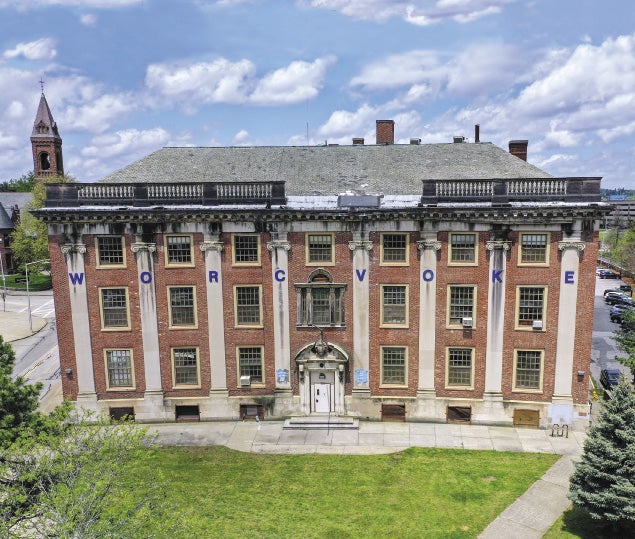
“For me, Lincoln Square is the nexus of all routes in and out of Worcester,” he said. “It’s got the grandeur and scale to warrant great attention.”
As city manager, O’Brien attempted to help facilitate redevelopment projects at the building, but historic reuse requirements, funding and a downturn in the economy halted any project, and the building remained off the city’s tax rolls.
With the Summit Academy out, the firm has engaged on an all-out marketing campaign to solicit interest from other companies.
There has been interest from biotech firms and other office uses. With UMass Memorial Medical Center, UMass Medical School, The Massachusetts College of Pharmacy and Health Services University, Worcester Polytechnic Institute all nearby, use as a healthcare facility or a return to an educational use are very much viable options, O’Brien said.
Thanks to the work done for the Summit Academy, questions about costs and timelines have been answered, said O’Brien, pegging the cost at a minimum of $13 million for core and shell reconstruction and a timeline of about a year.
How these three monumental projects fit together in a busy intersection will be the city’s burden, but WinnCos. has agreed to maintain a World War I memorial in a public courtyard in front of the building.
WinnCos. is already an established entity in Worcester, having redeveloped several properties into residential developments, including the adjacent Voke Lofts in the former Worcester Vocational Technical High School.
The proximity of those two properties could help make the project work.
“For a hometown boy, I’d love to be a part of something like this project,” O’Brien said.
The time is right
According to Augustus, Lincoln Square is one of the only remaining large swaths of land in Worcester in critical need of redevelopment activity.
Others have been checked off the list in recent years. Worcester Regional Airport now offers flights to four locations after having little commercial activity over the last decade, and a fifth destination is scheduled for flights to Detroit, starting in August.
In perhaps the city’s largest public-private redevelopment partnership, the former Worcester Galleria mall was transformed into a $565-million commercial and residential developments, a hotel and new retail and dining.
Since last August, it’s been all hands on deck as the city works with the Pawtucket Red Sox and Boston developer Denis Dowdle to redevelop more than 18 acres of vacant, underutilized or blighted real estate in the Canal District for an overall $240-million ballpark and mixed-use development.
“One by one, these things have been renovated, repurposed and reinvigorated,” Augustus said. “The Lincoln Square buildings are one of the last ones of those things.”
Elsewhere, smaller projects are taking shape, and those investors and developers are largely coming from the wealthier Boston area, including all three owners of the Lincoln Square buildings.
“After a while, we just stuck with it long enough and got the right folks at the right moment,” Augustus said. “There’s enough energy in the marketplace that people are seeing more opportunities.”
